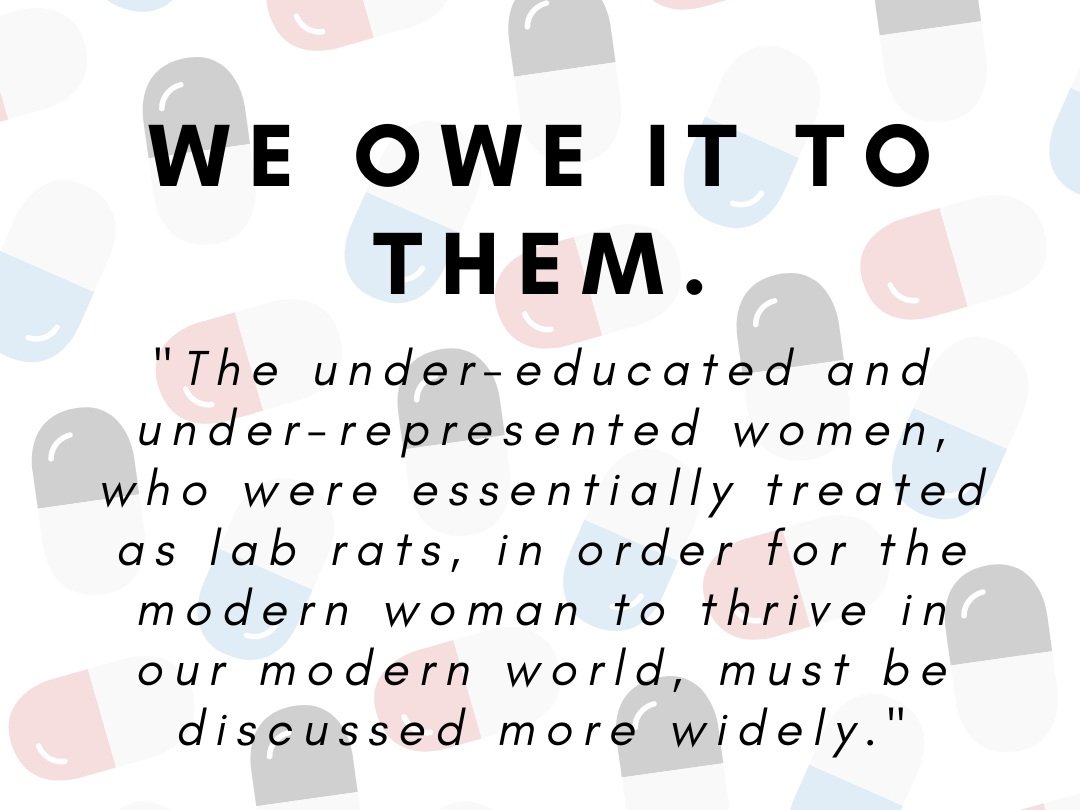The Mistaken Evolution of Birth Control
Maya Loubani
Birth control and oral contraception has historically been known as a revolutionary invention. Margaret Sanger was the first person to conceptualize the idea of a birth control pill around 1914, and the idea was furthered around the 1950’s when gynaecologist John Rock, biologist Gregory Pincus and the Planned Parenthood Federation of America worked together to create the first birth control pills (Pandia Health) in the 60’s. This introduction of ‘the pill’ into Western societies lifted many restrictions on women; the pill allowed for an effective way to prevent pregnancy and pain induced by menstruation, allowed for more education and economic opportunities for women, fewer unplanned pregnancies and abortions, family planning, etc.
While the revolutionary nature of the pill is important to discuss, I believe it is also essential to mention one of the least commonly discussed factors around the conception of the birth control pill: unethical and immoral methods of medical testing used on women in the developing world without explicit consent. Although the birth control pill is legendary in its attempt to aid the ‘modern woman’ and giving people who menstruate new opportunities, it is imperative to mention the way that these pills became approved for consumption in developed countries. We must pay tribute to the women in the developing world who were physically, emotionally and medically abused for the benefit of Western women, and mainly white centred women liberation and ‘feminism’.
The aforementioned biologist, Gregory Pincus, realized that his controversial methods of testing the new birth control pill could potentially put him in jail in Massachusetts; this is when he decided to take the testing to Puerto Rico, a country which was in a population boom and had high rates of illiteracy and poverty (BBC). Importantly, Gregory Pincus and Margaret Sanger, believed that Puerto Rico was the ultimate testing site for the pill, as they believed that birth control could be used in a eugenicist sense; they wanted to sterilize women and prevent any “undesirable” groups from reproducing (BBC).
Then came Enovid: the ‘world’s first birth control pill.’ It was slyly tested in Puerto Rico on unknowing participants; this was a severe case of an unethical clinical trial (Blakemore). Enovid was marketed as a new, safe and clinically tested way to provide treatment of menstrual disorders and reproductive health, while allowing for a new era of sexual autonomy. The women knew that this new pill would prevent pregnancy but were not aware of its new phases of experimentation (Liao and Dollin 757). Given their much higher doses of hormones than necessary, the test subjects faced significant complications; three women passed due to the fatal side effects, and additionally were never provided an autopsy (Liao and Dollin 758). The second major clinical trial regarding birth control was also tested unethically and non-consensually, on groups of men and women in mental asylums who lacked autonomy over their own bodies (Blakemore). This is ironic, as the concept of the pill is to provide women with autonomy over their own bodies – so why is this crucial history distorted?
Although the pill was successful in accomplishing the women's aim of not having children, this benefit does not outweigh the significant ethical issue of providing trial participants with insufficient information about what could happen to them while on the prescription. I believe that it is crucial to begin to teach the unethical history that I’ve outlined; we have only recently begun to understand the extreme difficulties and complexities that people who menstruate face.
Though the birth control pill brings benefits to people who menstruate around the world, it is irresponsible to collectively forget the atrocities committed on women in developing countries to the benefit of the modern, ‘feminist’, Western woman. Through examining the birth control pills complex and immoral history, it becomes clear that we must never forget the women who were subject to unethical treatment in order for other women to be able to enjoy the benefits of birth control pills. The under-educated and under-represented women, who were essentially treated as lab rats, in order for the modern woman to thrive in our modern world, must be discussed more widely. We owe it to them.
References
Birth control throughout history: Facts, superstitions, and Wives Tales. (2021, August 29). Retrieved October 25, 2021, from https://www.pandiahealth.com/resources/birth-control-throughout-history/
Blakemore, E. (2018, May 09). The first birth control pill used Puerto Rican women as Guinea Pigs. Retrieved October 25, 2021, from https://www.history.com/news/birth-control-pill-history-puerto-rico-enovid
How Latin America was key in the history of the contraceptive pill (and why no one celebrates it). (2018, January 7). BBC World. Retrieved from https://www.bbc.com/mundo/noticias-42274170
Liao, P. V., & Dollin, J. (2012, December). Half a century of the oral contraceptive pill: Historical review and view to the future. Can Fam Physician, 757-760.
Swift, B., & Becker, C. (2021, September 1). Birth control continues to fail women – so why has nothing changed? Retrieved October 25, 2021, from https://theconversation.com/birth-control-continues-to-fail-women-so-why-has-nothing-changed-164195
